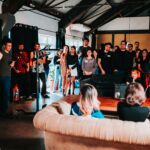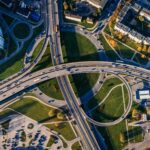At Articulous, we believe that diversity and inclusion are essential to building thriving communities. As society evolves, it is important to equip yourself to advance with it and aid others to navigate less inclusive environments.
As we reflect on the success of Brisbane Festival 2024, we’re inspired by the many purposefully inclusive creations and events produced this year by the Queensland Government and other independent bodies. From inclusive fashion runways and theatre productions spotlighting autistic voices to curated sensory gardens and experiences, Brisfest has certainly considered how to involve neurodiverse Brisbanites in the iconic event. This seamless inclusion and celebration of diversity aligns with our values at Articulous, which we have demonstrated throughout various community and industry projects.
Our efforts in the DEI space include:
- Collaborating on company-wide policy amendments in accessible communications models
- Publishing our reports and materials in line with Web Content Accessibility Guidelines, which include image descriptions, compatibility with screen readers as well as distinctly legible text
- Producing and developing widespread industry frameworks and policies in regard to diversity and inclusion
- Educating industry and community leaders on the importance this work in our ‘Diversity, Equity and Inclusion in Engagement’ (DEI) course, teaching non-intrusive inclusion techniques and structures for any created environment, whether that be a work or communal space or event.
Step 1: Learning – Why does DEI matter?
We’re all are shaped by living in a biased society, even though we might not realize it.
To correct and overcome biased thinking, it’s important to approach diverse communities with intentional sensitivity and challenge ourselves to think beyond societal norms and historical pre-conceptions. In regard to ability and neurodiversity, as more inclusive conversations around these topics are socially encouraged, so too do people feel supported to publicly identify as atypical. Creating spaces that promote consideration and support for a wider range of people not only increases the ability and willingness of diverse community members to engage, but also contributes to a wider shift in societal behaviour and understanding.
Step 2: Leadership – How can you be a change maker for the neurodiverse community?
Our ‘Diversity, Equity and Inclusion in Engagement’ training course features practical steps for leaders of change to promote inclusion for diverse community members, including neurodiverse people. Here is a sample of what we touch on:
1. Mind your language
This should be a no-brainer, but often people need to be reminded of the simple things! Using terminology that is considerate of everyone prevents discrimination and sets an inclusive example. If you overhear belittling language being used around you, the first step to creating change is to speak up about it.
2. Be aware of stereotyping
Misinformation is rife and no one person is the same. Putting people into boxes when it comes to labels is never helpful for engagement. If someone has the confidence to talk about their neurodivergence, respect their personal experiences and ask for clarification – rather than categorizing all neurodiverse people as Sheldon Cooper!
3. Not everything is visible
We’re not always wearing our hearts on our sleeves when it comes to showing who we are and our abilities. Your consideration of everyone’s needs, even without being explicitly told, could make a substantial improvement to someone’s day, mood and willingness to engage.
4. Know the triggers
Asking for personal experiences beyond stereotypical assumptions can provide insight into what people’s individual triggers may be. These can range from light and sound sensitivity to needing stability through consistent routines. It’s important to note that everyone is unique and every ability is experienced differently. Knowing what you can account for in the space you create will only be achieved through conversation and exploration rooted in genuine care.
Inclusion – The end results.
These aren’t just useful skills and ideas that assist neurodiverse people, but are universally applicable to making everyone feel included and facilitating positive engagement or participation in your workspace, community and life. By learning about DEI, you’ll gain new understandings of the unspoken privilege, politics and power dynamics held by neurotypical people, which shape the societal structures we commonly follow. Ultimately, DEI teaches you new ways of looking at the world and the people within it so that you can create a space that works positively and productively for everyone.






